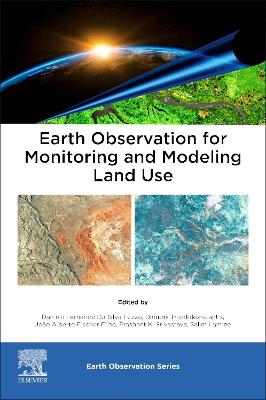Sustainability Handbook, Volume 1
 -10%
portes grátis
-10%
portes grátis
Sustainability Handbook, Volume 1
Von Rosing, Mark
Elsevier - Health Sciences Division
05/2024
576
Mole
Inglês
9780323901109
15 a 20 dias
Descrição não disponível.
1. Introduction Part 1 - Sustainability Way of Thinking 2. What is Sustainability and why is Sustainability so important3. What is the difference between Environment, Social and Economic aspects and how do they relate4. Understanding the Sustainability Environment, Social and Economic trends within the market5. Sustainability and Environmental factors6. What Is Environmental Sustainability?7. The growing importance of environmental aspects8. Sustainability and Corporate Social Responsibility9. What drives customer loyalty? 10. Cooperation in R & D and eco-innovations11. Innovation Management and Corporate Social Responsibility12. Environmental Risk Management Strategies and the Moderating Role of Corporate Social Responsibility13. Sustainability and Economic Factors14. Circular economy - Fundamental challenges for business environment17. An Accounting Proposal to Boost Companies Toward Sustainability Part 2 - What do the Leaders do 18. Identifying the Sustainability Leaders, the research and scoring mechanism19. The 100 Worldwide Sustainability Leaders20. Chr. Hansen Holding A/S21. Kering SA22. Neste Corporation23. Orsted24. GlaxoSmithKline plc25. Prologis, Inc.26. Umicore27. Banco do Brasil S.A.28. Shinhan Financial Group Co.29. Taiwan Semiconductor30. Conclusion Part 3 - What can we learn from the leaders 31. What do the Sustainability Leaders do different32. The emergence of business sustainability: Educational, practical and research implications33. Gathering the Leading Practices from the Sustainability Outperformers34. The value of a Sustainability Ontology35. The Sustainability Practices gathered in a Sustainability Ontology36. How to use the Sustainability Ontology Part 4 - Sharing the practices from the leaders 38. The secret ingredient: Directional aspects39. Understanding the UN Sustainability goals40. Aligning Strategy with the UN Sustainable Development Goals41. Sustainability the strategy of the future - - the new strategic opportunity42. Sustainability Competencies Part 5 - Sustainable Business Models: An Imperative in the Strategic Management of Companies and Organizations 44. Challenges of transforming a Business Model to a Sustainable Business Model 45. Building Sustainability Competencies - the Sustainability Center of Excellence46. Sustainability Owners47. The emerging role of the Chief Sustainability Officer48. Sustainability Ownership49. The secret ingredient: Roles (employees)50. Ensuring That Sustainability Stands on Human Resource Management51. The need for a standardized and common Sustainability Training Part 6 - The Strategic Process of Developing Social Aspects of Sustainability Through the Reflection in Education 53. Real Time Learning Sustainability54. Sustainability eXpert Training55. Sustainability Owner Training56. Sustainability Culture57. Sustainability and processes58. Sustainable manufacturing59. Integrate Sustainability in your flows60. Integrating CSR in Innovation Value Networks61. Analyzing the interactions among barriers of sustainable supply chain management practices62. Sustainability policies, guidelines and procedures63. Sustainability Measures (KPIs) Part 7 - Evaluation on Impacts of Information-Decision Support Systems for Sustainability of Business Development 64. Sustainability IT65. towards a new generation managerial model based on green IT and corporate social responsibility66. Sustainability Infrastructure67. Critical Success Factor for Sustainable Facilities Management: A Review of Literature 68. Clean Products and Services69. How to integrate Sustainability into your products and services70. Sustainability Channels70. The Journey Ahead
Este título pertence ao(s) assunto(s) indicados(s). Para ver outros títulos clique no assunto desejado.
Artificial Intelligence; best practices; case studies; Climate change; corporate social responsibility; Digital Transformation; Economics; Environment; governance; healthcare; human rights; Inclusive growth; Industry 4.0; Innovation; international relations; Lifecycle; Methods; outsourcing; Smart Cities; Society; standards; Strategy; Sustainable Development Goals; Transformation
1. Introduction Part 1 - Sustainability Way of Thinking 2. What is Sustainability and why is Sustainability so important3. What is the difference between Environment, Social and Economic aspects and how do they relate4. Understanding the Sustainability Environment, Social and Economic trends within the market5. Sustainability and Environmental factors6. What Is Environmental Sustainability?7. The growing importance of environmental aspects8. Sustainability and Corporate Social Responsibility9. What drives customer loyalty? 10. Cooperation in R & D and eco-innovations11. Innovation Management and Corporate Social Responsibility12. Environmental Risk Management Strategies and the Moderating Role of Corporate Social Responsibility13. Sustainability and Economic Factors14. Circular economy - Fundamental challenges for business environment17. An Accounting Proposal to Boost Companies Toward Sustainability Part 2 - What do the Leaders do 18. Identifying the Sustainability Leaders, the research and scoring mechanism19. The 100 Worldwide Sustainability Leaders20. Chr. Hansen Holding A/S21. Kering SA22. Neste Corporation23. Orsted24. GlaxoSmithKline plc25. Prologis, Inc.26. Umicore27. Banco do Brasil S.A.28. Shinhan Financial Group Co.29. Taiwan Semiconductor30. Conclusion Part 3 - What can we learn from the leaders 31. What do the Sustainability Leaders do different32. The emergence of business sustainability: Educational, practical and research implications33. Gathering the Leading Practices from the Sustainability Outperformers34. The value of a Sustainability Ontology35. The Sustainability Practices gathered in a Sustainability Ontology36. How to use the Sustainability Ontology Part 4 - Sharing the practices from the leaders 38. The secret ingredient: Directional aspects39. Understanding the UN Sustainability goals40. Aligning Strategy with the UN Sustainable Development Goals41. Sustainability the strategy of the future - - the new strategic opportunity42. Sustainability Competencies Part 5 - Sustainable Business Models: An Imperative in the Strategic Management of Companies and Organizations 44. Challenges of transforming a Business Model to a Sustainable Business Model 45. Building Sustainability Competencies - the Sustainability Center of Excellence46. Sustainability Owners47. The emerging role of the Chief Sustainability Officer48. Sustainability Ownership49. The secret ingredient: Roles (employees)50. Ensuring That Sustainability Stands on Human Resource Management51. The need for a standardized and common Sustainability Training Part 6 - The Strategic Process of Developing Social Aspects of Sustainability Through the Reflection in Education 53. Real Time Learning Sustainability54. Sustainability eXpert Training55. Sustainability Owner Training56. Sustainability Culture57. Sustainability and processes58. Sustainable manufacturing59. Integrate Sustainability in your flows60. Integrating CSR in Innovation Value Networks61. Analyzing the interactions among barriers of sustainable supply chain management practices62. Sustainability policies, guidelines and procedures63. Sustainability Measures (KPIs) Part 7 - Evaluation on Impacts of Information-Decision Support Systems for Sustainability of Business Development 64. Sustainability IT65. towards a new generation managerial model based on green IT and corporate social responsibility66. Sustainability Infrastructure67. Critical Success Factor for Sustainable Facilities Management: A Review of Literature 68. Clean Products and Services69. How to integrate Sustainability into your products and services70. Sustainability Channels70. The Journey Ahead
Este título pertence ao(s) assunto(s) indicados(s). Para ver outros títulos clique no assunto desejado.
Artificial Intelligence; best practices; case studies; Climate change; corporate social responsibility; Digital Transformation; Economics; Environment; governance; healthcare; human rights; Inclusive growth; Industry 4.0; Innovation; international relations; Lifecycle; Methods; outsourcing; Smart Cities; Society; standards; Strategy; Sustainable Development Goals; Transformation







